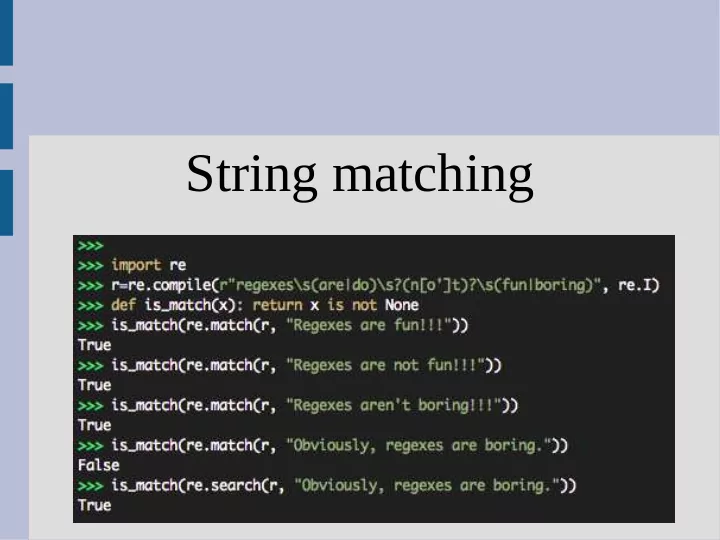

String matching
Announcements Programming assignment 1 posted - need to submit a .sh file The .sh file should just contain what you need to type to compile and run your program from the terminal
String matching Some pattern/string P occurs with shift s in text/string T if: for all k in [1, |P|]: P[k] equals T[s+k] T P s=5
String matching Both the pattern, P, and text, T, come from the same finite alphabet, ∑ . empty string (“”) = ε w is a prefix of x=w [ x, means exists y s.t. wy = x (also implies |w| < |x|) (w ] x = w is a suffix of x)
Prefix w prefix of x means: all the first letters of x are w x prefixes of x suffixes of x not english!
Suffix If x ] z and y ] z, then: (a) If |x| < |y|, x ] y (b) If |y| < |x|, y ] x (c) If |x| = |y|, x = y
Dumb matching Dumb way to find all shifts of P in T? Check all possible shifts! (see: naiveStringMatcher.py) Run time?
Dumb matching Dumb way to find all shifts of P in T? Check all possible shifts! (see: naiveStringMatcher.py) Run time? O(|P| |T|)
Rabin-Karp algorithm A better way is to treat the pattern as a single numeric number, instead of a sequence of letters So if P = {1, 2, 6} treat it as 126 and check for that value in T
Rabin-Karp algorithm The benefit is that it takes a(n almost) constant time to get the each number in T by the following: (Let t s = T[s, s+1, ..., s+|P|]) t s+1 = d(t s – T[s+1]h) + T[s+|P|+1] where d = | ∑ |, h= d |P|-1
Rabin-Karp algorithm Example: ∑ = {0, 1, ..., 9}, | ∑ | = 10 T = {1, 2, 6, 4, 7, 2} P = {6, 4, 7} t 0 = 126 t 1 = 10(126-T[0+1]10 3-1 ) +T[0+|P|+1] t 1 = 10(126-100) +T[0+3+1] t 1 = 264
Rabin-Karp algorithm This is a constant amount of work if the numbers are small... So we make them small! (using modulus/remainder) Any problems?
Rabin-Karp algorithm This is a constant amount of work if the numbers are small... So we make them small! (using modulus/remainder) Any problems? x mod q=y mod q does not mean x=y
Hash functions
One way functions Modulus is a one way function, thus computing the modulus is easy but recovering the original number is hard/impossible 127 % 5 = 2, or 127 mod 5 = 2 mod 5 However if we want to solve x%5=2, all we can say is x=2+5k or some k
One way functions Other one way functions?
One way functions Other one way functions? - multiplication - hashing Multiplication is famous, as it is easy: 200*50 = 10,000 ... yet factoring is hard: 132773= 31 * 4283 (what alg?)
One way functions Hashing is another commonly used function for security/verification, as... -fast (low computation) -low collision chance -cannot easily produce a specific hash
One way functions
Hash functions
Rabin-Karp algorithm Larger q (for mod): - larger numbers = more computation - less frequent errors There are trade-offs, but we often pick q > |P| but not q >> |P| Pick a prime number as q
Rabin-Karp algorithm Kabin-Karp-Matcher(T,P,| ∑ |,q,) d=| ∑ |, h=d |P|-1 mod q, p=0, t 0 = 0 for i=1 to |P| // “preprocessing” p = (dp + P[i]) mod q // for P t 0 = (dt 0 + T[i]) mod q // for T for s = 0 to |T| - |P| if p == t s , check brute-force match at s if s < |T| - |P| then compute t s+1
Rabin-Karp algorithm To compute t s+1 : t s+1 =(d(t s -t[s+1]h)+T[s+|P|+1]) mod q
Rabin-Karp algorithm Example: T = {1, 2, 5, 3, 5, 2, 6, 3} P = {2, 5}, q = 5, assume base 10
Rabin-Karp algorithm Example: T = {1, 2, 5, 3, 5, 2, 6, 3} P = {2, 5}, q = 5, assume base 10 P = 25 mod 5 = 0, t 0 = 12 mod 5 = 2 t i+1 =10*(t i -T[i+1]*10)+T[i+|P|+1]%q t 1 = 25 mod 5 = 0, true match! t 2 = 53 mod 5 = 3, t 3 = 35 mod 5 = 0, false match
Rabin-Karp algorithm T = {1, 2, 5, 3, 5, 2, 6, 3}, P = {2, 5} t 5 = 52 mod 5 = 2, t 6 = 26 mod 5 = 1, t 7 = 63 mod 5 = 3 t i+1 =10*(t i -T[i+1]*10)+T[i+|P|+1]%q So only s=1 is match
Rabin-Karp algorithm Run time? (Average? Worst case?)
Rabin-Karp algorithm Run time? - “preprocessing” (first loop)= O(|P|) - “matching” (second loop) = O(|T|) So O(|T|+|P|) and as n>m, O(|T|) on average Worst case: always a match O(|T| |P|)
Recommend
More recommend